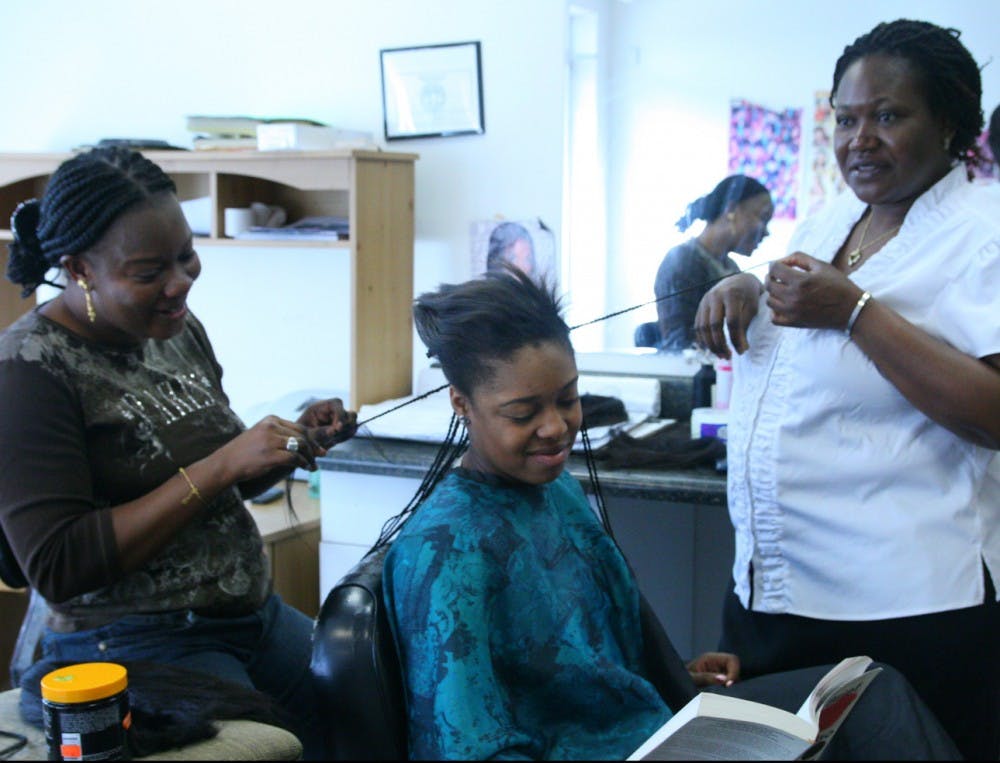Sophomore Maya Jumper sat in a beautician’s chair Tuesday as two African braiders worked a weave into her hair.
“It’s my first time,” Jumper said. “I was tired of doing my hair.”
She said though the braids will be easier to take care of, she’ll probably continue to pay the high price for relaxers, a process that chemically straightens naturally curly or kinky hair. The treatment can cost between $50 and $150 and lasts about six weeks.
Jumper, like others, said she’d rather go home to Washington, D.C., to get the treatment, but the distance prevents her.
But she and other students have said the lack of local services for black hair has restricted their hair care options.
To deal with the perceived lack of services, some UNC students are turning to natural hair, support groups and self-maintenance.
Supply meets demand
Because students say they don’t expect shops to be able to handle their hair, stores stop carrying the necessary products or don’t have staff on hand who have the training for black hair.
“There’s really no place for black people to get their hair done except for, like, the Hair Cuttery and Delaine’s,” Jumper said. “I guess there’s really no market for black hair.”
Kaaren Greene, a stylist at Famous Hair, formerly the Hair Cuttery, said the Franklin Street salon gives out 10 to 15 relaxers a week, but many black people don’t know they offer any services.
“A lot of people pass us along because they assume that we don’t do African-American hair in here,” she said.
Greene, who has relaxed hair, said the salon’s four stylists who have the experience to work with black hair are all black themselves.
She said because the salon is part of a franchise, stylists have to distribute corporate advertisements that rarely promote black hair care services.
“They never have anything for relaxers,” Greene said.
Alan Corpus, owner of Salon 135 on Franklin Street, said his shop does offer services like hair cuts for black customers but doesn’t advertise relaxers — or even keep the products necessary for them — due to lack of demand.
“We don’t ever get any African-American people who want relaxers done here,” he said.
“We don’t ever get calls for it. That’s why we don’t keep the chemicals for it.”
The salon only gives out about two or three relaxers per year, and all are given to white customers, he said.
“We don’t work much with African-American hair,” Corpus said. “None of the stylists here have the experience.”
Rather than try to find a salon, Student Body President Jasmin Jones has opted for a cheaper solution since freshman year: giving herself her relaxers.
“It’s, like, $65 versus $6,” she said.
A controversial treatment
Some students question why they should use damaging chemicals to straighten their hair and have joined a cultural movement urging blacks to go natural.
UNC junior Jamila Reddy started getting her hair chemically straightened when she was in sixth grade.
“I was picked on a lot when I was in elementary school because a lot of girls got relaxers before I did,” she said. “I had two little ponytails, and they called them Afro-puffs.”
In October of her freshman year, Reddy made the transition back to natural hair, but it wasn’t easy.
“I cut all of my relaxed hair off,” she said. “I had a teeny-weeny Afro. I felt like a boy. I felt unfeminine. But that’s what my hair’s supposed to look like.”
Relaxers have drawn criticism because of chemicals like lye and ammonium thioglycolate that are integral to the treatment’s straightening ability, something Greene said she saw first-hand at beauty school.
“We set an empty can of Coke in a relaxer overnight, and it disintegrated it,” she said.
Finding support
To cope with the difficulty and high cost of finding hair care in Chapel Hill, some students have turned to the advice of others.
Precious Ogbuefi and four other UNC students started the campus group S.T.R.A.N.D.S. — Students Transitioning, Relaxed and Naturals Developing Self-Awareness.
The group, set to become official in fall 2010, held an interest meeting March 21.
“We all kind of went around the room and talked about hair stories,” said Ogbuefi, who transitioned to natural hair during spring break when her hair started thinning from the relaxers’ chemicals.
Reddy created a blog called College Curlies to help college women transitioning to or working with their natural hair.
“There is a connotation with natural hair, sometimes negative, sometimes positive,” Reddy said. “But mostly I think it’s just misunderstood.”
Contact the City Editor at citydesk@unc.edu.
Black students seek hair care options
Students ?nd few options for black hair

Maguette Mbaye, left, and Stephanie Soulama, right, braid a weave into sophomore Maya Jumper’s hair. DTH/Erica O’Brien

